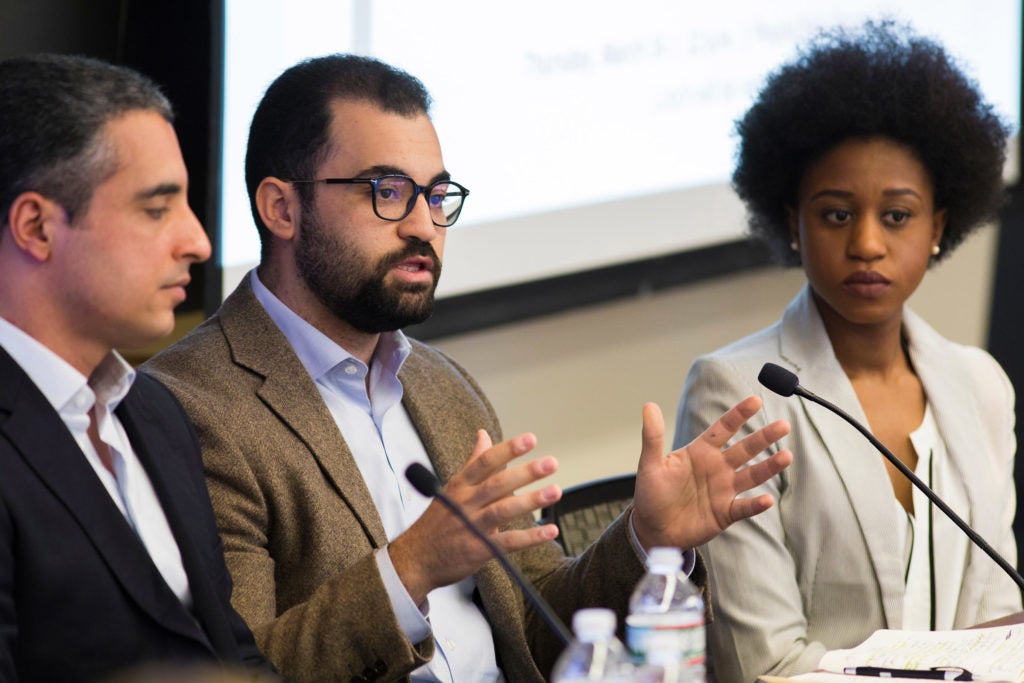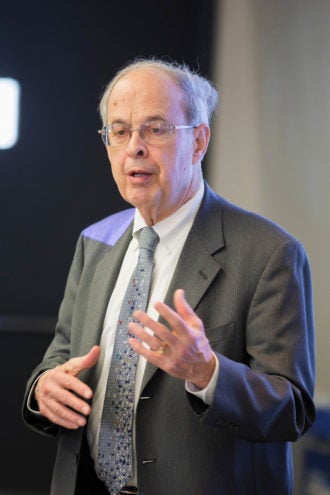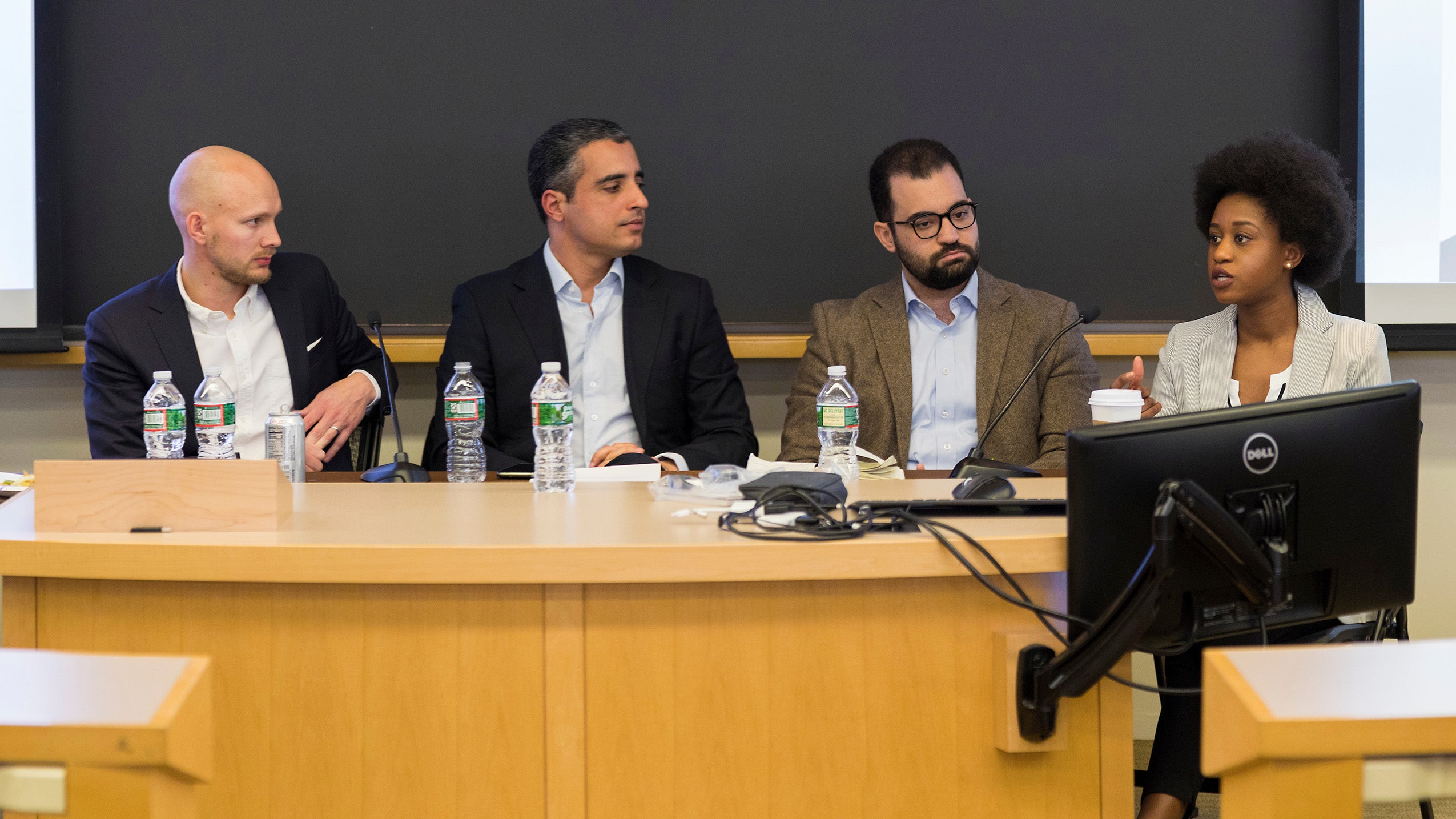Every year, Harvard Law School’s LL.M. (Master of Laws) program includes a significant number of students who work in or with the judiciary. The LL.M. Class of 2019, with eight current or former judges, 18 Supreme or Constitutional Court clerks, and a district magistrate, is no exception. On March 14, four of the judges gathered in Pound Hall for a panel discussion.
“We thought the theme for today that would really cross the work of the judiciary across the world is leadership: the way that judges step up, to take a more active role in carrying out their judicial function,” explained the Hon. John C. Cratsley (Retired), who served as moderator. Judge Cratsley served for 24 years on the Massachusetts Superior Court and now teaches the Judicial Process in Trial Courts clinic and seminar at HLS.

Chikondi Mandala, from Malawi, has been a judicial officer since 2014, first as a magistrate and then as an Assistant Registrar in the High Court, a role that combines presiding as a judge in chambers with administrative responsibilities. “Over the last 10 or 15 years, there’s been a lot of laws amended or enacted that relate to women,” she explained, including laws relating to marriage, divorce, inheritance, and wills. “Because we don’t have a judicial training institute, there’s no way for judges or magistrates to get re-oriented in the law, apart from personal initiative.” As a member of the Women Judges Association, Mandala has been involved in compiling training manuals on the new laws and organizing interactive workshops, not only for judicial officers but also for police, prosecutors, and others in the justice system.
Sherif Ayoub, from Egypt, has served since 2013 as a junior judge on the Administrative Court of Cairo, which hears cases brought by individuals against government agencies. “Since 2011, as you may all know, Egypt has undergone serious and critical transitions. This has had a tremendous effect on the rule of law, and on us, as judges,” he observed, in part because people have felt that they could now address corruption and other governance issues through the courts, instead of through the political process. The legal issues that were presented were often so new that there were no statutes addressing them. “We had to do what a common law judge would do — we had to create rules out of custom. This is not something a civil law judge is accustomed to doing. This was a huge challenge for the courts.”
Etiene Coelho Martins, from Brazil, is a judge in the Federal Trial Court. He also runs a court-annexed mediation program, where 30 volunteer mediators handle about 1600 cases a year. His goal is to make mediation a normal part of the judicial process, especially in complex disputes. “Sometimes you look at a case, and say my decision would not settle it as it should be settled, if they [found] an alternative path,” he explains. Before becoming a judge, Martins was a police officer for 16 years, and he is also working to introduce mediation and negotiation into police interactions with the public, especially in violent situations.

Emil Nordin, from Sweden, is a junior judge, serving most recently on the Svea Court of Appeal. He described a trial court survey which asked defendants who had received verdicts how much of the verdict they understood. “The court came to the conclusion that some defendants only understood 30-40% of the verdict they had received,” he noted, “so what we’ve been doing is to work with the language and try to simplify it as much as possible.” The survey also asked the defendants if they could identify the principal figures involved in the proceedings. They sometimes confused the prosecutor with the plaintiff’s lawyer, or were unsure what the law clerk did, so judges now introduce all of the participants, Nordin added.
The session became especially lively when Judge Cratsley invited the judges to comment on the initiatives their classmates had just described. Martins’ focus on mediation, for example, sparked much further discussion. In Egypt, Ayoub noted, mediation “is still under development,” and though often mandatory, it is seen as an administrative step in going to trial. “It is very hard to shift your culture, from becoming a judge to being a mediator,” he observed. “As a mediator, you take an active role with the parties, which is not something that judges are trained to [do].”
Even amid their very different experiences and judicial systems, the four judges discovered common ground. Nordin’s story “takes me back home,” Mandala said, describing efforts to not only translate laws into vernacular languages but to also eliminate some legalese. Nordin, for his part, underscored the importance of the training materials that Mandala has been working on: “manuals and mind maps — anything that helps you when you sit down with a case — [are] so valuable,” he agreed.
The discussion was presented by the HLS Graduate Program and the Harvard Law School Library.
